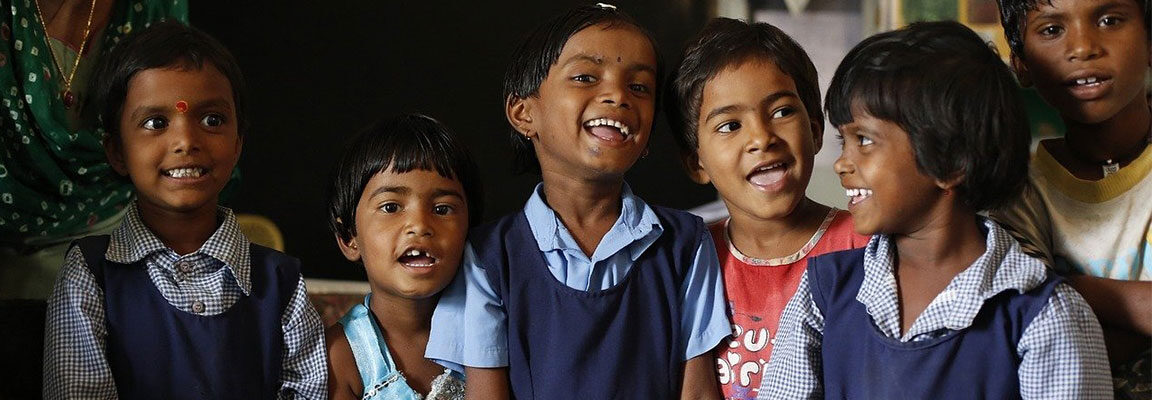


Date : Aug 28 , 2020 | Featured,Opinion
Suchetha Bhat, CEO of Dream a Dream, writes that the pandemic gives us the opportunity to reflect on the shortcomings of our approach to education and reimagine it for the future.
The United Nations has described the global scale of education disruption from COVID-19 as “unparalleled”. The 2019–20 Coronavirus pandemic has affected educational systems worldwide, leading to widespread closures of schools, universities and colleges. While students across the board have been impacted by the pandemic, it is important to explore the severe impact on children from marginalized communities in many countries of the global south, including India which, at 260 million children, has the largest school-going population in the world.
As the impact of the pandemic unfolds, it is becoming abundantly clear that traditional learning models and schools have ill-equipped us and our children to understand, make meaning, respond and adapt to the uncertainty and vulnerabilities emerging from the current crisis. The last few years have seen the discourse around education reform moving towards making children work-ready for jobs of the future. An approach that has become outdated due to 3 – main reasons:
The pandemic and its impact on educational ecosystems require for us to reflect on the existing systemic inequities that have become more visible in the recent months. We see schools rushing for immediate solutions to sustain academics, but there are far-reaching effects on students and teachers when they are forced to adopt online learning. Our policymakers need to take into account the fact that marginalised communities do not have easy access to digital infrastructure. The need of the hour is to ensure education is available to all, rather than to ensure those who can afford education continue to receive it.
The psychological impact on children, whose lives are suddenly changed forever has largely been left unaddressed; they are expected to adapt when even we, the adults who are meant to guide young people have no clarity on what to expect from the future.
Where do we go when all this is over? If one is ‘lucky enough’ to have not been completely displaced by the pandemic, one hopefully goes to school. But just how prepared are schools to respond to this reality? We have all experienced collective grief and loss at a global and unimaginable level. We need to let this sink in. And then, when we are ready to respond, let us ask ourselves what is the most compassionate offer we can make to our children under these circumstances? Will our best foot forward be dumping our own anxiety of ‘loss of learning’ on them? Or will we recognise that they have learnt perhaps the most difficult lesson of their lives in the last few months as they stayed put in their homes? The role of teachers in the upbringing of young people is often overlooked.
#Whatif, instead of examinations based on rote-learning, we ask our students; ‘Do you know how to be kind to each other? Do you know how to make decisions that are good for you, your community and for the planet? Do you know how to collaborate and celebrate the success of others? Do you know how to heal?’
Current systems follow a one-size-fits-all approach, whereas the reality is that in a country like India, such an approach is tough to put into practice. We need an education system that is sensitive to the myriad impact of adversity on children from vulnerable backgrounds. When designing solutions, the needs of these sections of society deserve more attention than they presently receive. The New Education Policy, while a positive step in the right direction, once again lacks clarity on implementation. It remains to be seen how such a revolutionary step in education will affect a country as diverse and vast as ours bearing in mind that not everyone will have access to the same kind of facilities and infrastructure. Another challenge that we foresee is the measurement of success upon implementation and the way forward from there.
The framework for education should start by redefining the purpose of education to mean ‘thriving for all’. We conducted a study to better understand what it means to thrive. Are the indicators the same when children come from adversity? Do tailored approaches need to be followed to achieve desired outcomes across the board? We have found that empathetic adults and safe spaces allow young people to fully discover their potential and thrive despite coming from adversity. At the centre of this approach lies kindness and the willingness to listen, holding spaces for young people to express themselves and be treated as unique individuals.
Academic outcomes can be affected by several factors that are out of the control of educators. Scoring high marks does not necessarily mean that a child is prepared for whatever the future may throw at them. Adopting an approach that places thriving at the centre of education is much more inclusive and helps young people seek a more meaningful engagement with life.
Date : Jul 4 , 2024
Date : Jun 27 , 2024
Date : Jun 15 , 2024
Date : Apr 5 , 2024
Date : Mar 28 , 2024
Date : Jan 25 , 2024
Date : Mar 22 , 2023
Date : Mar 15 , 2022